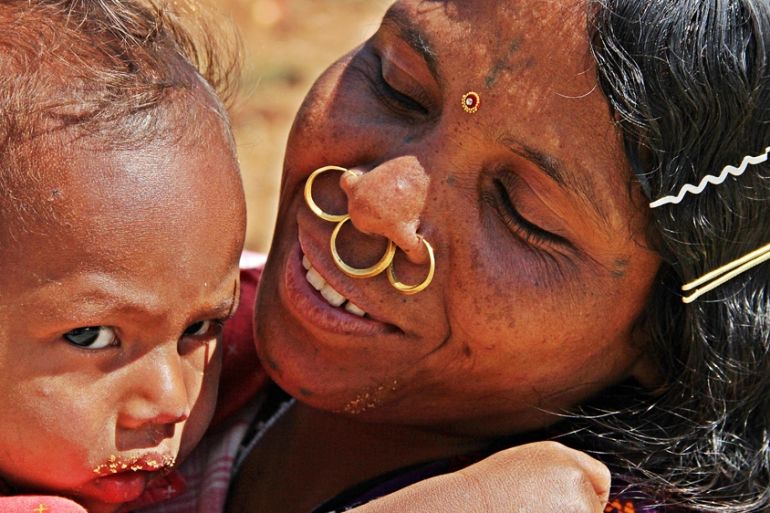India’s forest dwellers plan protests against mass eviction order
Indigenous groups plan protests against Supreme Court verdict to evict over 1 million tribal people from forestlands.

New Delhi, India – India‘s top court’s order to evict more than a million forest dwellers has sparked anger among activists, with tribal groups calling for mass protests against the verdict.
Spokespeople for indigenous tribal groups, who are likely to be the worst affected by the Supreme Court’s order, say that the move plays into the hands of corporate lobbies.
Keep reading
list of 4 itemsNigeria’s women drivers rally together to navigate male-dominated industry
‘I blame the government’: Poor Kenyans say no support amid record flooding
‘We need you’: Solomon Islands’ support for US agency’s return revealed
The top court’s order came in response to a petition against the constitutional validity of Forest Rights Act (FRA) of 2006, filed by some environmental groups and retired forest officers who said the law impeded conservation efforts.
Rights groups have questioned the government’s commitment to indigenous peoples as its lawyer failed to appear before the top court.
Under the FRA, at least 150 million people could have had their rights recognised to about 40 million hectares of forestlands.
Since the landmark law was passed in 2006, the forest department undertook a massive exercise to weed out those who were not “traditional forest dwellers”.
The petitioners had demanded that those who could not prove their claims over the forestlands under the FRA should be evicted.
Tribal claims
Although the court reserved its judgment on the constitutional validity of the law, it ordered that the people whose claims have been rejected should be evicted by July 27.
“It’s the negligence of forest officials and their anti-Adivasi [anti-tribal] bias that has led to these rejections,” said Anusuia Uikey, the vice chairman of the National Commission for Scheduled Tribes.
“Adivasi life is entirely based around Jal, Jungle, Jameen [water, forest, land]. Many of Adivasis claims were rejected, as they could not produce proof.
”Adivasi
. Many of Adivasis claims were rejected, as they could not produce proof.”]
“Our commission itself has observed such wrong practices. We have given several notices to the forest department seeking reevaluation.”
FRA, passed by the previous Congress-led government, which is now the main opposition party, acknowledges the injustice suffered by tribal and other forest-dwelling communities.
It allowed individual and community title claims first filed to gram sabha (village council), then approved by a sub-divisional committee and a divisional committee.
Citing a 10-year study (2006 to 2016) by Rights Resources, a coalition of developmental organisations to advance the land and resource rights of indigenous peoples, Uikey said that “between 2006 and 2016 the forest department recognised the rights of only three percent of population that was expected to benefit from the FRA”.
Tribal groups from different parts of the country are preparing to launch street protests over the issue of land and forest rights barely two months before the parliamentary elections.
Diluting earlier legislation
Activists have accused the government led by Prime Minister Narendra Modi of diluting earlier legislation meant to protect the rights of farmers and indigenous people over land and natural resources.
Keshav Sori, director of DISHA, an NGO based in Bastar region of Chhattisgarh state, said, “Adivasis have been occupying traditional land for generations, but as most of them are unaware of the act and its provisions, it puts all the power at the hands of government officials.”
He said that none of the people in Bastar region, to his knowledge, had received any written acknowledgement of the FRA claims they filed over 10 years ago. “What is shocking is that the status of rejection is still unknown to most cases,” Sori added.
With the increased mining and industrial projects in forest areas, the court’s order will have long-term implications for indigenous communities, lawyers say.
“As land and forest are intrinsic to the identity and existence of indigenous communities, the recent Supreme Court judgement could be disastrous for the future,” said Lalsu Nagoti, lawyer and activist based in Gadchiroli, Maharashtra.
The outrage has been most visible on social media.
“Adivasis will have to revolt against this decision,” Chotubhai Vasava, a legislator from Modi’s home state of Gujarat posted on his Facebook page.
“Three people sitting in a courtroom cannot decide the fate of millions of Adivasis,” Vasava, also a prominent tribal leader, said.
Facing heat from the tribal groups ahead of the elections, the government has pledged to safeguard tribal rights.
“Ministry of Tribal Affairs is well aware of its responsibilities of defending the Constitutional validity of the Forest Rights Act and the ministry will do everything at its disposal to safeguard the interests of the tribals as it has been doing so far,” the Ministry of Tribal Affairs said in a statement.